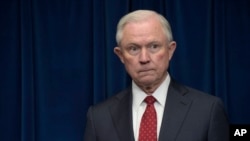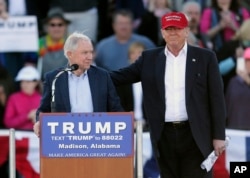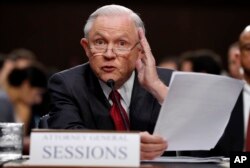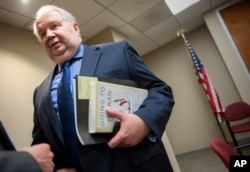After days of enduring pointed criticism from President Donald Trump and calls from Congressional Democrats to testify over his contacts with Russian officials, Attorney General Jeff Sessions' former colleagues in the Senate came to his defense on Tuesday.
Senator Lindsey Graham, a prominent Republican member of the Senate Judiciary Committee and former presidential candidate, and Richard Shelby, another Senator from Sessions' home state of Alabama, took to Twitter to refute Trump's latest censure of his embattled attorney general.
Graham called Sessions "a rock solid Conservative" and "one of the most decent men I've met in my political life" and questioned Trump's censure that Sessions had failed to investigate former political rival Hillary Clinton.
“President Trump’s tweet today suggesting Attorney General Sessions pursue prosecution of a former political rival is highly inappropriate,” Graham tweeted.
“On occasion, I’ve vigorously disagreed with Jeff but I’ve never once doubted his integrity or sense of fair play,” Graham wrote in another tweet.
Shelby called Sessions "a man of integrity, loyalty, and extraordinary character."
"I join the people of Alabama in giving Jeff Sessions my deep respect and unwavering support," Shelby tweeted.
Under fire
The two Senators' vigorous defense of Sessions came after Trump took another jab at Sessions on Tuesday and suggested that Clinton, the Democratic candidate in last year's presidential election, should be the one facing scrutiny.
"Attorney General Jeff Sessions has taken a VERY weak position on Hillary Clinton crimes (where are E-mails & DNC server) & Intel leakers!" Trump wrote.
That followed a Monday tweet in which Trump described Sessions as "our beleaguered A.G." and asked why he was not "looking into Crooked Hillarys crimes & Russia relations?"
Sessions was the first U.S. Senator to endorse Trump's candidacy during last year's presidential campaign. After his victory, Trump tapped him to lead the Department of Justice, making Sessions the nation's top law enforcement officer. But the two former allies grew distant after the attorney general recused himself from the federal investigation into Russian meddling in the election.
In an interview with the New York Times last week, Trump said he never would have picked Sessions for attorney general had he known Sessions would recuse himself from the Russia probe. The job passed to Deputy Attorney General Rod Rosenstein, who then appointed Robert Mueller as special counsel overseeing the Russia investigation, which Trump has repeatedly called a "witch hunt."
In a New York Times interview, Trump also accused Sessions of “giving bad” answers during his confirmation hearing in February when he was asked if he had had any contacts with Russian officials during the campaign.
“He gave some answers that were simple questions and should have been simple” Trump said.
Sessions recused himself In March after it emerged that he had failed to disclose details of his contacts with former Russian ambassador to Washington, Sergey Kislyak, during his confirmation hearing.
Sessions denied that he had misled members of the Judiciary Committee that voted to confirm his nomination, and said that he withdrew from any role in the Russia probe because he had served as a campaign adviser to Trump.
Replacement talk
Trump's public criticism of his attorney general has sparked speculation that the president is considering replacing him with loyalist.
White House spokeswoman Sarah Huckabee Sanders said last week that Trump was disappointed in Sessions’ recusal decision but had confidence in him.
“Clearly, he has confidence in him or he would not be the attorney general,” Sanders said.
But on Tuesday, Anthony Scaramucci, the new White House Communications director, was asked by conservative talk show host Hugh Hewitt if Trump wants Sessions out.
"I have an enormous amount of respect for the attorney general, but I do know the president pretty well, and if there's this level of tension in the relationship that's public, you're probably right," Scaramucci replied.
Former New York City mayor Rudy Giuliani, another former Trump campaign adviser and ally, has been mentioned as a possible successor. Guiliani, who was under consideration for Secretary of State during the transition, dismissed reports on Monday that he was a candidate and said Sessions had made the right decision when he recused himself from the Russia investigation.
Sessions has not addressed Trump's criticism but he told reporters last week that he would stay on the job "as long as that is appropriate."
Kislyak connection
The Washington Post reported on Friday that Kislyak told his superiors in Moscow last year that he had discussed campaign-related matters with Sessions, contradicting what Sessions has said about those meetings. The newspaper said the information came from intercepted communications between Kislyak and Moscow.
“This is a serious matter, and the Judiciary Committee must hear directly from the attorney general,” Senator Dianne Feinstein wrote in a letter to Committee Chairman Chuck Grassley, urging him to ask Sessions to testify.
Al Franken, another Democratic member of the Judiciary Committee and a Trump critic, called the purported conversation between Sessions and Kislyak a “very troubling development in the relationship between the Trump team and Russia."
“It is now clearer than ever that Jeff Sessions needs to testify again in front of the Senate Judiciary Committee so that we can get some answers,” Franken wrote on Facebook on Friday. However, Franken later told CNN, Grassley “does not want [Sessions] to come back.”
A spokesman for Grassley told VOA late Monday that the committee chairman does want Sessions to appear later this year, once the attorney general's team of senior officials is in place, "so we could get a complete picture of how the department is functioning with a full staff."
The spokesman, Taylor Foy, said the Democratic minority in the Senate has "insisted on dragging out the confirmation process for Justice Department nominees," and this had made it more difficult for the committee to perform its function of oversight.
The Senate Judiciary Committee oversees the work of the Department of Justice, and it is one of several Congressional panels investigating Russian meddling in last year's presidential election.







